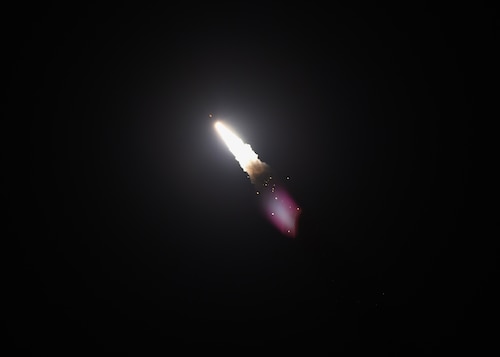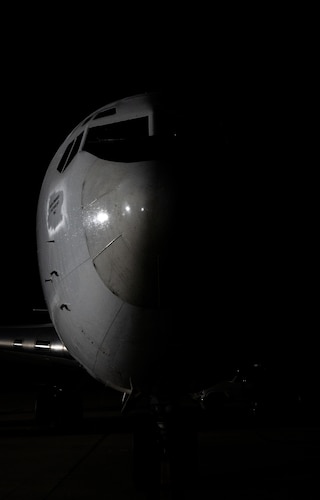A joint team of Air Force Global Strike Command Airmen and Navy aircrew launched an unarmed Minuteman III intercontinental ballistic missile equipped with multiple targetable re-entry vehicles from aboard the Airborne Launch Control System Nov. 5, from Vandenberg Space Force Base, California.
Airmen from the 625th Strategic Operations Squadron out of Offutt Air Force Base, Nebraska, were aboard the U.S. Navy E-6B Mercury to demonstrate the reliability and effectiveness of the ALCS system.
This test launch is part of routine and periodic activities intended to demonstrate that the United States' nuclear deterrent is safe, secure, reliable and effective to deter 21st century threats and reassure our allies. Such tests have occurred over 300 times before, and this test is not the result of current world events.
"These tests are demonstrative of what Striker Airmen bring to the fight if called by the president," said Gen. Thomas A. Bussiere, commander of AFGSC. "An airborne launch validates the survivability of our ICBMs, which serve as the strategic backstop of our nation's defense and defense of allies and partners."
The ICBM's reentry vehicle traveled approximately 4,200 miles to the U.S. Army Space and Missile Defense Command's Ronald Reagan Ballistic Missile Defense Test Site located within Republic of the Marshall Islands at the Kwajalein Atoll. Reagan Test Site sensors, including high-fidelity metric and signature radars, as well as optical sensors and telemetry, support the research, development, test and evaluation of America's defense and space programs. For these tests, RTS team members collect radar, optical and telemetry data in the terminal phase of flight to evaluate system performance.
"RTS is honored to be the nation's only long-range land impact site providing our strategic partners a safe environment and truth in testing for the continued development of the ICBM modernization efforts," said Army Lt. Col. Casel Rumfelt, RTS range director. "This range and testing facilitate America's technical advantage on the global stage. Our team brings decades of experience and a level of professionalism that makes the impossible seem easy in a no-fail environment. I couldn't be prouder of this incredible team."
The test launch is a culmination of months of preparation that involve multiple government partners. Airmen from all three missile wings were selected for the task force to support the test launch. The missile bases within AFGSC have crew members standing alert 24 hours a day, year-round, overseeing the nation's ICBM alert forces.
The ICBM community, including the Department of Defense, the Department of Energy, and U.S. Strategic Command, uses data collected from test launches for continuing force development evaluation. The ICBM test launch program demonstrates the operational capability of the Minuteman III and ensures the United States' ability to maintain a strong, credible nuclear deterrent as a key element of U.S. national security and the security of U.S. allies and partners.
Air Force Global Strike Command is a major command with headquarters at Barksdale Air Force Base, Louisiana, in the Shreveport-Bossier City community. The command oversees the nation's three intercontinental ballistic missile wings, the Air Force's entire bomber force, to include B-52, B-1 and B-2 wings, the B-21 program, Air Force Nuclear Command, Control and Communications systems, and operational and maintenance support to organizations within the nuclear enterprise. Approximately 33,700 professionals are assigned to two Numbered Air Forces, nine wings, two geographically separated squadrons and one detachment in the continental United States and deployed to locations around the globe.
The LG-35A Sentinel will replace the Minuteman III ICBM with an initial capability of 2029. Until full capability is achieved in the mid-2030s, the Air Force is committed to ensuring Minuteman III remains a viable deterrent.









